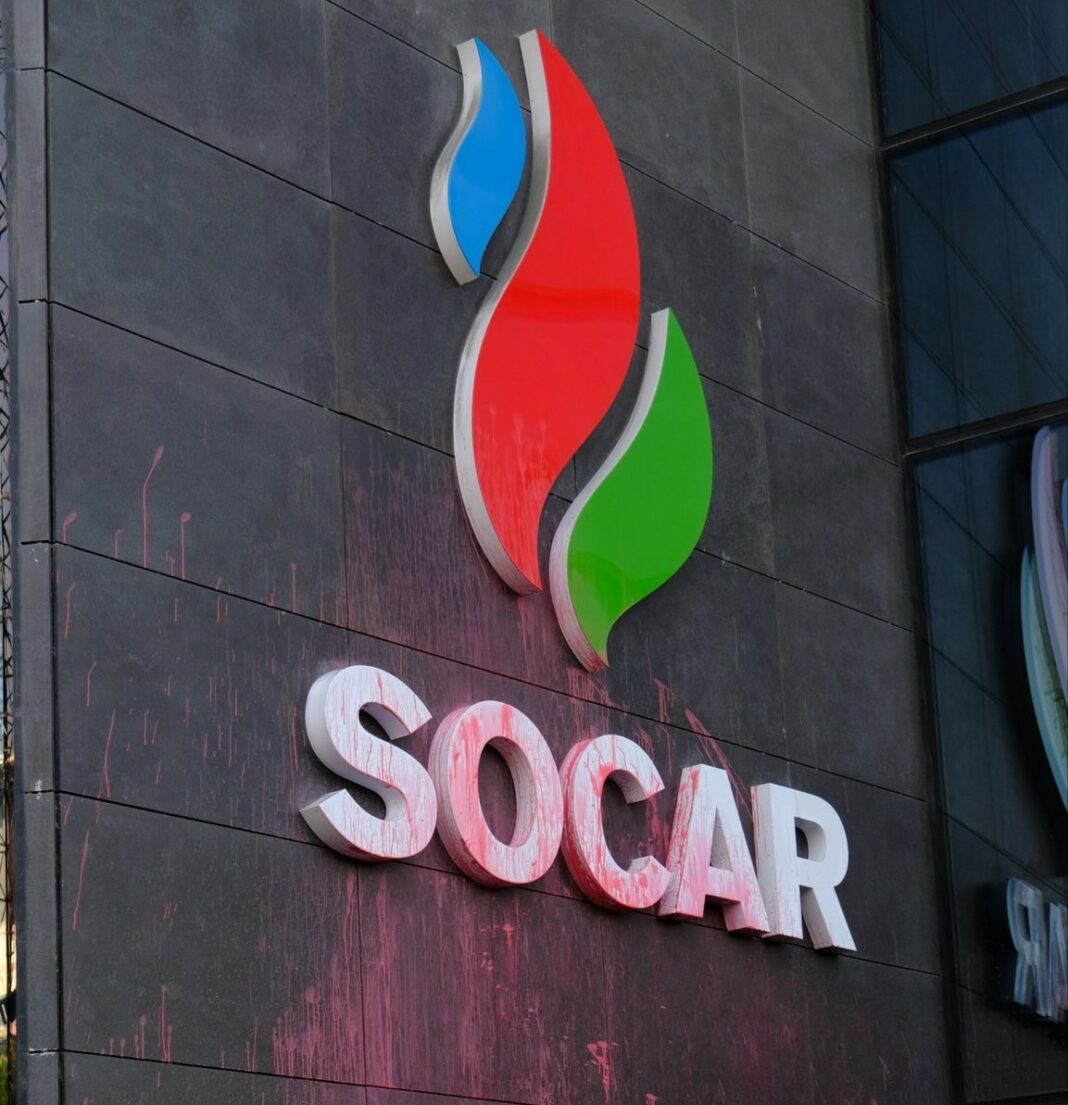Pro-Palestine activists stormed the İstanbul office of Azerbaijani energy company SOCAR on Friday, accusing the state-owned firm as well as the Turkish government of “fueling Israel’s genocide in Palestine” through the Baku-Tbilisi-Ceyhan (BTC) pipeline, which supplies around 40 percent of Israel’s annual crude oil consumption.
The protesters, mainly members of the group “A Thousand Youths for Palestine,” covered the building in red paint to symbolize blood.
“Filistin İçin Bin Genç” oluşumu Azerbaycan petrol şirketi Soccar’ın Istanbul ofisi önünde eylem yaptı. Kırmızı renkte boyalarla Soccar’ın girişinde “katil” yazıyor. pic.twitter.com/RCrmv3vrQk
— Onur Öncü (@oencueonur) May 31, 2024
The group announced their protest on social media, stating, “As Israel commits genocide in Palestine for nine months, Azerbaijan and Turkey are complicit by transporting millions of barrels of oil to fuel this genocide. We will continue to voice our protest and will not allow this bloody trade to continue.”
REFAHI BOMBALAYAN JETLERİN PETROLÜNÜ SAĞLAYAN SOCARDAN FİLİSTİN HALKI ADINA HESAP SORMAYA GELDİK! 🇵🇸 İNTİFADA SESİNİ BU TOPRAKLARA TAŞIYACAĞIZ DEMİŞTİK, SÖZÜMÜZÜ TUTTUK ✌🏾 pic.twitter.com/qCWplnZ2lt
— Filistin İçin Bin Genç (@filistinicinbin) May 31, 2024
SOCAR, a state-owned company, has been under scrutiny for its involvement in the BTC pipeline, which transports Azerbaijani crude oil through Turkey to the Mediterranean port of Ceyhan. From there, the oil is shipped to various destinations, including Israel.
Investigative journalist Metin Cihan highlighted that the BTC pipeline, operated by British Petroleum (BP), supplies around 40 percent of Israel’s annual crude oil consumption. Cihan criticized the terms of the BTC agreement, which obligates Turkey to maintain the oil flow even during conflict, prioritizing oil trade over human rights and national sovereignty.
The fuel for the jets striking Gaza is supplied by Azerbaijan and transported by Turkey to zionist entity. pic.twitter.com/IdbVl5wTNP
— Filistin İçin Bin Genç (@filistinicinbin) June 1, 2024
The protesters also called on workers at Ceyhan port to strike and stop the shipment of oil barrels destined for what they describe as “a genocidal regime.”
Despite Turkey’s public condemnation of Israel’s military actions in Gaza and a recent halt to bilateral trade, the BTC pipeline continues to operate. The binding agreements from 1999 mandate its operation regardless of regional developments.
Experts and rights groups have criticized the agreements as “colonialist” for granting BP privileges and imposing obligations on the signatory states, requiring them to relinquish part of their sovereignty to ensure the pipeline’s operation.
The ongoing humanitarian crisis in Gaza has intensified scrutiny of Turkey’s trade practices with Israel. President Recep Tayyip Erdoğan’s government recently restricted exports to Israel, but revelations of continued trade have sparked criticism and raised questions about Turkey’s support for Israel.
Israel’s military campaign in Gaza, which began on October 7 following an unprecedented attack by Hamas, has led to significant casualties and devastation. Turkey, a vocal critic of Israel’s actions, has accused the Israeli government of committing war crimes and genocide in Gaza.
